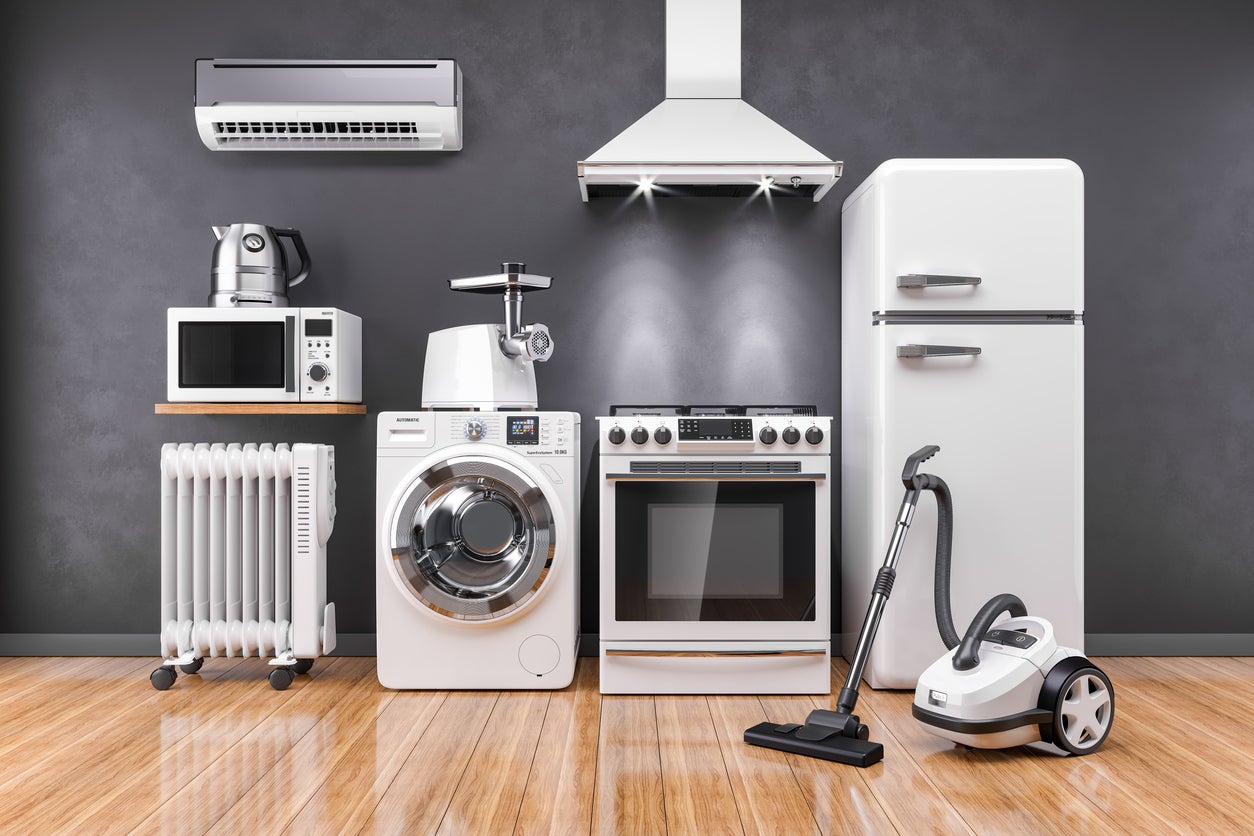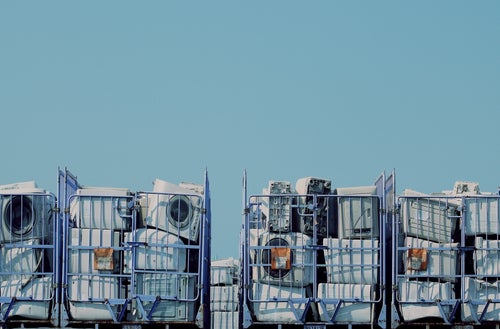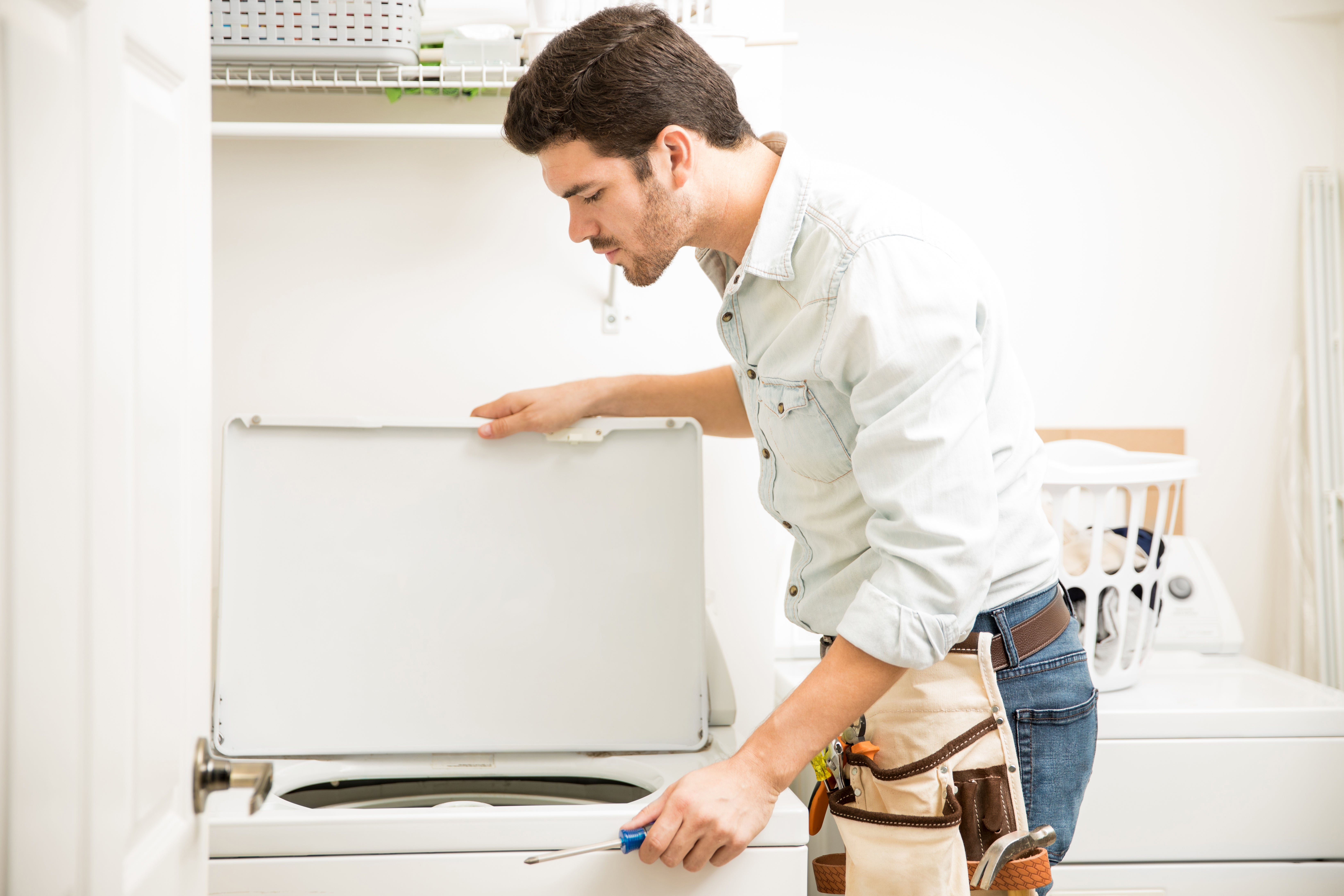
Home appliances, especially older models, can use a lot of energy. Many environmentally minded consumers wonder if it’s more earth-friendly to repair old appliances, replace them with more energy-efficient models, or recycle them.
If you want to learn about eco appliance repair, environmentally friendly appliances, and how to recycle older models, American Home Shield® is here to help.
Should I Repair My Old Appliance?
In general, it’s usually more environmentally and economically friendly to keep appliances until they start to malfunction frequently. Knowing when to repair and replace broken appliances will help you on your sustainability journey.
Given their initial investment, large appliances—such as fridges, washers, dryers, and ovens—should be preserved for as long as reasonably possible. It’s generally recommended that you repair your larger appliances for the first 5 to 10 years, depending on how often they’re used. If you’ve purchased something of exceptionally high quality, this period can extend to 20 years.
Smaller appliances like microwaves are likely only worth repairing if they’re relatively new or under five years old. The exception would be if the repair is quite simple and can be done without paying too much out of pocket.
Fixing common appliances can be accomplished by finding appliance replacement parts online or hiring a professional.
When is the Right Time to Upgrade My Appliances?
When appliances start to break down, most people think first of the inconvenience—and reasonably so. Knowing that you must beat the clock to save your rapidly defrosting freezer items makes it hard to consider much else.
Before trying to resolve the inconvenience immediately, take a moment to reflect on the environmental implications of your decision. Extending the life of an energy-guzzling appliance may only further drive up your power bill and exacerbate your carbon footprint. It can be difficult to know what is worse for the planet: keeping an inefficient machine running, contributing to technology waste by throwing appliances away, or trying your hand at recycling appliances. The following questions will help you determine which path to take.
How old is your appliance? Old appliances are seldom as energy efficient as newer, eco-friendly appliances. Thanks to the marvels of modern technology, environmentally friendly home appliances built to run using less power are popular and accessible. If the appliances in your home are more than 10 to 15 years old, they may be expensive to repair and detrimental to the environment.
Does your appliance still work well? There’s a distinct difference between an appliance that works and an appliance that works well. An appliance that runs smoothly will require less power to function, meaning less strain on precious resources. Performance and the sounds produced by your appliance can be a good indicator of how well your machine works.
Will an appliance upgrade be worthwhile? For an upgrade to be worthwhile, you’ll need to weigh the economic and environmental costs of replacing your appliance. For example, if your 15-year-old fridge needs new coils, a complete replacement may be more practical than spending half the price of a new one to keep an old, inefficient appliance running.
What are the Benefits of Replacing Old Appliances?

It’s easy to see the benefit of replacing an old appliance that isn’t working properly or requires frequent repairs. However, even when old appliances are working well enough, you may want to consider upgrading your home appliances to be kinder on the planet.
Here are the benefits of upgrading to eco-friendly appliances.
New vs. old refrigerators:
Upgrading your refrigerator can have good implications for both the environment and your wallet.
A new ENERGY STAR-certified refrigerator uses about nine percent less energy than models that only “meet the federal minimum energy efficiency standard.” You could save hundreds per year by upgrading while putting less pollution into the atmosphere.
Learn about the American Home Shield® refrigerator warranty.
New vs. old stoves:
Old gas cooktops are far from the most efficient option for cooking. Traditional gas cooktops have an efficiency of approximately 32 percent, while modern induction cooktops are around 85 percent efficient. Induction cooktops use coils to create a magnetic field that generates heat directly within compatible cookware, rather than wasting energy by heating the surrounding air as conventional stoves do. Learn more about the pros and cons of induction cooktops.
Learn about the American Home Shield® oven, cooktop, and range warranty.
New vs. old clothes washers and dryers:
Clothes washers and dryers can be significant energy drains in the home, so why not make sure you have machines that are as energy efficient as possible? An ENERGY STAR-certified clothes washer “uses about 25 percent less energy and 33 percent less water than regular washers.” The best part is that these models can save you up to $370 in energy costs.
According to ENERGY STAR, if all dryers sold were certified energy efficient, we could prevent “greenhouse gas emissions equivalent to those from more than two million vehicles”—just another benefit of upgrading to an environmentally friendly appliance.
Learn about the American Home Shield® washer and dryer warranties.
New vs. old dishwashers:
Dishwashers use large amounts of water and electricity, so it’s important to make sure yours is energy efficient. ENERGY STAR estimates that by switching to a newer, certified dishwasher, you can save an average of 3,870 gallons of water over its lifetime and about $35 a year on utility costs.
Before you’re tempted to get rid of your dishwasher altogether, remember that dishwashers are usually more efficient than handwashing dishes. Just make sure you don’t pre-rinse dishes before loading them into the dishwasher and only run the appliance when it’s full.
Learn about the American Home Shield® dishwasher warranty.
New vs. old microwave ovens:
Microwaves are frequently replaced household appliances because their relatively low price tag makes replacement more convenient than repair. It can be trickier to pick a new microwave that’s environmentally friendly; but thanks to new standards implemented in 2016, new microwave ovens have been built to use less power in standby mode in an effort to conserve energy.
Learn about the American Home Shield® built-in microwave oven warranty.
Should I Always Replace an Old Appliance?

Although new appliances tend to be more energy-efficient than older ones, replacing an old, still-functioning appliance with a more efficient one comes with its own disadvantages. After all, your personal environmental footprint extends further than your home. Before buying a new eco-friendly house appliance, consider the resource costs associated with manufacturing and delivering your replacement as well as the environmental toll of sending your appliance to the dump.
While it’s not always easy to track the direct impact of your purchases, it’s safe to say that in some cases, it’s better to stick with the old model—especially if it’s still working well.
If your older appliance is still trucking along, you may want to hold off on buying a new one until you can get the best price. Learn more about the best time to buy new appliances.
How Do I Reuse Old Appliances?
Figuring out how to dispose of old appliances can be tricky. If improperly disposed of, old appliances can sometimes release hazardous, ozone-depleting substances. Here are some options to keep your appliance out of the landfill for a bit longer if it is still in working condition:
Sell it: Post your appliance on Facebook Marketplace, Craigslist, and OfferUp.
Give it away: Check if any local nonprofits may be interested in giving it a second life or donating it to a person in need.
How Do I Recycle Old Appliances?
There are a couple of options for appliance recycling:
1. Check with your local gas and electric companies.
If you’d like to get paid for your environmental efforts, consider recycling old appliances with your local utilities company. Many companies offer energy reduction programs with rebate options.
2. Participate in an appliance swap.
Many retailers provide appliance swaps if you buy a new appliance through them. The retailer will remove and recycle your old appliance when they deliver your new one.
3. Drop off at a public works pickup.
Many city governments offer eco appliance recycling programs. Your local government may have an appliance recycling program, often through its Public Works Department. Just make sure that the program abides by the U.S. Environmental Protection Agency’s Responsible Appliance Disposal program. If it does, the pickup service will ensure that your appliance’s parts are recycled appropriately and that any hazardous substances are properly disposed of.
What’s Next?

AHS assumes no responsibility, and specifically disclaims all liability, for your use of any and all information contained herein.
SOURCED FROM: https://www.ahs.com/home-matters/quick-tips/is-it-environmentally-friendly-to-replace-old-appliances/

 Facebook
Facebook
 X
X
 Pinterest
Pinterest
 Copy Link
Copy Link


